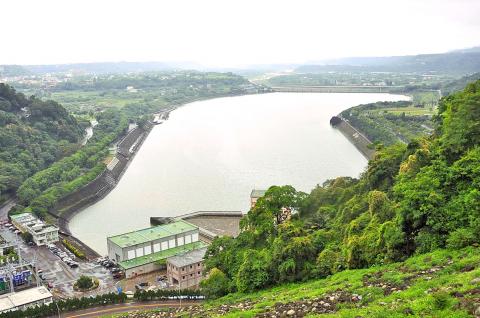Third-phase water rationing in areas supplied by Taoyuan’s Shihmen Reservoir (石門水庫) has been lifted with immediate effect, thanks to heavy rain on Monday night, the Ministry of Economic Affairs said yesterday.
“There is no need to carry out the third-phase water rationing measures in the near future, as we now estimate there will be 47 million cubic meters of water in the Shihmen Reservoir by the end of next month,” Vice Minister of Economic Affairs Yang Wei-fu (楊偉甫) told reporters after a water supply meeting.
The ministry has a meeting on Friday to discuss the areas that depend on the reservoir for water — Taoyuan, as well as parts of New Taipei City and Hsinchu County — but after about 8 million cubic meters of water fell in the facility’s catchment area during heavy rainfall at about midnight on Monday, the ministry lifted the third-phase water rationing measures, Yang said.

Photo: CNA
The reservoir’s water level had risen to above 32 percent of its capacity after the rain, Yang said.
In addition, the Central Weather Bureau (CWB) forecast that rainfall is to return to near-normal levels next month, which could ease the water shortage in northern regions, Yang added.
The areas supplied by the reservoir are still in second-phase water rationing, with industrial users’ water supplies cut by 5 percent, while supplies to high-use non-industrial consumers are cut by 20 percent, the ministry said.
However, the rain in the north was not brought by Typhoon Noul, whose impact was limited to the nation’s south, with the catchment areas of the Zengwen Reservoir (曾文水庫) in Chiayi County collecting 300,000 cubic meters of water and the Nanhua Reservoir (南化水庫) in Tainan receiving 100,000 cubic meters, the ministry said.
Yang said Friday’s meeting would include discussions on whether to enact third-phase water rationing in Kaohsiung and Tainan.
Last week, the ministry postponed the measures for another week, as rainfall helped boost the flow of the Gaoping River (高屏溪).

CHAOS: Iranians took to the streets playing celebratory music after reports of Khamenei’s death on Saturday, while mourners also gathered in Tehran yesterday Iranian Supreme Leader Ayatollah Ali Khamenei was killed in a major attack on Iran launched by Israel and the US, throwing the future of the Islamic republic into doubt and raising the risk of regional instability. Iranian state television and the state-run IRNA news agency announced the 86-year-old’s death early yesterday. US President Donald Trump said it gave Iranians their “greatest chance” to “take back” their country. The announcements came after a joint US and Israeli aerial bombardment that targeted Iranian military and governmental sites. Trump said the “heavy and pinpoint bombing” would continue through the week or as long

TRUST: The KMT said it respected the US’ timing and considerations, and hoped it would continue to honor its commitments to helping Taiwan bolster its defenses and deterrence US President Donald Trump is delaying a multibillion-dollar arms sale to Taiwan to ensure his visit to Beijing is successful, a New York Times report said. The weapons sales package has stalled in the US Department of State, the report said, citing US officials it did not identify. The White House has told agencies not to push forward ahead of Trump’s meeting with Chinese President Xi Jinping (習近平), it said. The two last month held a phone call to discuss trade and geopolitical flashpoints ahead of the summit. Xi raised the Taiwan issue and urged the US to handle arms sales to

State-run CPC Corp, Taiwan (CPC, 台灣中油) yesterday said that it had confirmed on Saturday night with its liquefied natural gas (LNG) and crude oil suppliers that shipments are proceeding as scheduled and that domestic supplies remain unaffected. The CPC yesterday announced the gasoline and diesel prices will rise by NT$0.2 and NT$0.4 per liter, respectively, starting Monday, citing Middle East tensions and blizzards in the eastern United States. CPC also iterated it has been reducing the proportion of crude oil imports from the Middle East and diversifying its supply sources in the past few years in response to geopolitical risks, expanding

Pro-democracy media tycoon Jimmy Lai’s (黎智英) fraud conviction and prison sentence were yesterday overturned by a Hong Kong court, in a surprise legal decision that comes soon after Lai was jailed for 20 years on a separate national security charge. Judges Jeremy Poon (潘兆初), Anthea Pang (彭寶琴) and Derek Pang (彭偉昌) said in the judgement that they allowed the appeal from Lai, and another defendant in the case, to proceed, as a lower court judge had “erred.” “The Court of Appeal gave them leave to appeal against their conviction, allowed their appeals, quashed the convictions and set aside the sentences,” the judges